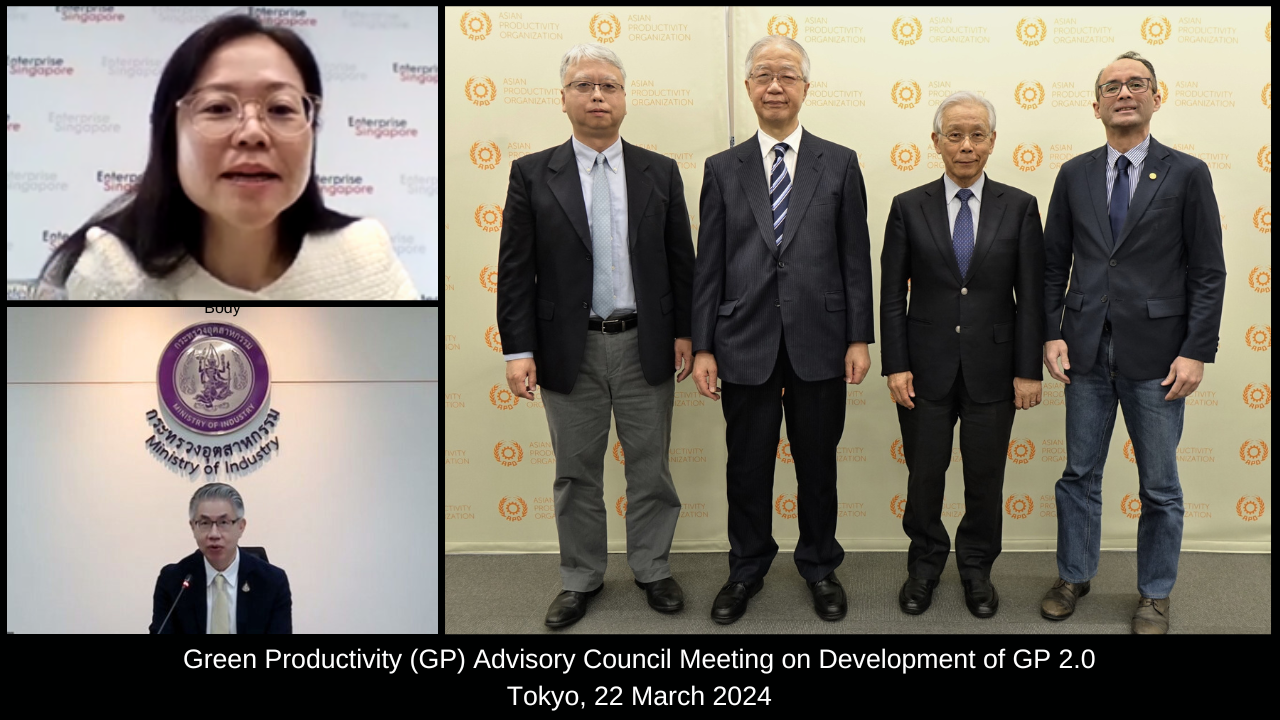
Select Page

Online (top to bottom): APO Director for Singapore Joanne Tan and APO Director for Thailand Dr. Nattapol Rangsitpol.
Standing (L–R): TWG Chair on GP 2.0 Dr. Chun-Hsu Lin; GPAC Chair Prof. Emeritus Ryoichi Yamamoto, The University of Tokyo; Science and Technology Advisor to the Minister of Foreign Affairs, Japan, Prof. Yoichiro Matsumoto; and APO Secretary-General Dr. Indra Pradana Singawinata.
The first Green Productivity 2.0 Advisory Council (GPAC) meeting was held in hybrid modality on 22 March, chaired by Prof. Emeritus Ryoichi Yamamoto, The University of Tokyo. The GPAC comprises Prof. Yoichiro Matsumoto, Science and Technology Advisor to the Minister of Foreign Affairs, Japan; APO Director for Indonesia Dr. Anwar Sanusi; APO Director for Singapore Joanne Tan; APO Director for Thailand Dr. Nattapol Rangsitpol; and APO Secretary-General Dr. Indra Pradana Singawinata. Due to unforeseen circumstances, Council Member Dr. Anwar Sanusi was unable to attend the meeting.
During his opening remarks, Secretary-General Dr. Indra stressed the crucial role of the APO in presenting methods for enterprises in its members to grow sustainably. He emphasized that GP initiatives complemented efforts to meet the UN SDGs, which resulted from the 2015 Paris Climate Agreement with the goal of keeping the average global temperature rise well below 2°C and as close as possible to 1.5°C above preindustrial levels.
GPAC Chair Prof. Emeritus Yamamoto welcomed council members and pointed out that the World Meteorological Organization had reported that 2023 had been the warmest year on record with a global average near-surface temperature 1.45°C above the preindustrial baseline level, while ocean surface temperatures were at record highs. The climate tipping point was nearer than thought, and both green innovation and social transformation to a carbon-neutral, nature-positive, circular economy were urgent.
Technical Working Group (TWG) on GP 2.0 Chair Dr. Chun-Hsu Lin presented the proposed GP 2.0 roadmap to address gaps at regional level in decoupling socioeconomic development from environmental degradation. Actions included sector-specific approaches and development of a GP 2.0 ecosystem linked to social, economic, and environmental aspects of sustainability.
The meeting discussed recommendations on the roadmap prepared by the TWG. The final report will be submitted to the APO Governing Body for approval.